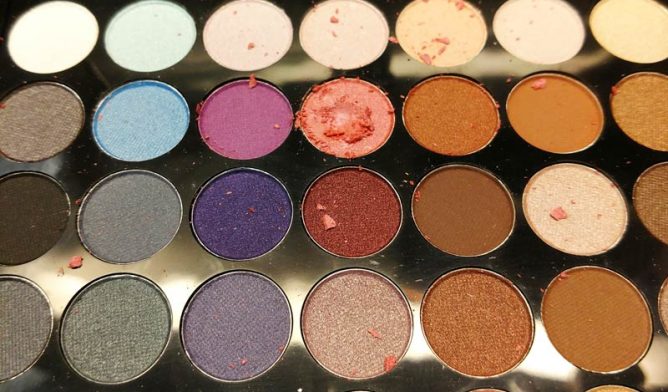New Tests Find Asbestos-Contaminated Talc in Eyeshadow
Asbestos Exposure & BansWritten by Tim Povtak | Edited By Walter Pacheco

The Scientific Analytical Institute in Greensboro, North Carolina, recently uncovered asbestos-contaminated talc in two new eyeshadow makeup products sold online on sites like Amazon and eBay.
Its findings were the latest example in a growing list of talc-based cosmetic products found to contain toxic asbestos.
Scientific Analytical Institute found asbestos fibers in 40% of the shades tested in Jmkcoz 120 Colors Eyeshadow Palette. It found traces of asbestos in 20% of the shades tested in the Beauty Glazed Gorgeous Me Eye Shadow Tray Palette.
The results were released by the Environmental Working Group in Washington, D.C., which had commissioned the laboratory testing as part of a larger investigation involving the safety of children’s products.
Both products are marketed to women of varying ages.
“We urge anyone who has purchased either of these products for themselves, family or friends to take necessary steps to ensure they are no longer being used,” said Tasha Stoiber, a senior scientist at the Environmental Working Group, in a press release. “And we call on these companies and online retailers to immediately pull both of these products from their respective websites.”
The inhalation or ingestion of microscopic asbestos fibers can cause serious long-term medical issues, including malignant mesothelioma, lung cancer and ovarian cancer.
Testing Follows FDA Asbestos-Contaminated Talc Study
Talc is used with hundreds of products to absorb moisture and improve their feel. The issue of asbestos-containing talc stems from the mining of the two naturally occurring minerals that often are found in close proximity near the Earth’s surface.
These latest findings come in the wake of a recent year-long study by the U.S. Food and Drug Administration that found contaminated talc in nine of 52 cosmetic products it tested.
The previous nine were recalled at various times after the public was notified. Some have returned to market. Some recalls involved only the particular batch that was tested.
Products tested earlier, with brand, include:
- Claire’s Compact Powder style #83915-9
- Claire’s Contour Palette style #40194-3
- JoJo Siwa Makeup Set, Claire’s
- Contour Effects Palette 2, City Color
- Timeless Beauty Palette, City Color
- Matte Blush (Fuchsia), City Color
- Shimmer Bronzer (Caramel), City Color
- Bronzer (Sunset), City Color
- Johnson’s Baby Powder, Johnson & Johnson
The FDA is expected to release more results from its ongoing tests later in 2020.
Makeup Testing Methods Still Debated
Recent findings also have been disputed by manufacturers of the products, which often cite different test results and different testing methods.
AMA Analytical Services Inc. in Lanham, Maryland, handled testing for the FDA.
The transmission electron microscopy method found asbestos in all nine of the tests for the FDA, but in only two of the nine using polarized light microscopy, another testing method.
Scientific Analytical Institute, which handled the latest findings, also used transmission electron microscopy, which is considered the most precise.
Another issue in the testing dispute has been the exact quantification of asbestos minerals.
In January 2020, a team of experts from different federal agencies recommended the FDA standardize testing of talc for potentially harmful mineral products. The idea was to end the discrepancies in analyzing talc for asbestos and other toxic substances. Some private laboratories will find asbestos in talc, while others will not.
FDA Lacks Regulatory Power over Cosmetics
Under current law, the FDA does not have the power to effectively regulate cosmetic products or ingredients. Cosmetic companies do their own safety testing, but often using different testing methods.
Companies that market cosmetics also have a legal responsibility to ensure the safety of their products.
Johnson & Johnson, for example, is facing more than 15,000 lawsuits from consumers who are claiming its talc products have caused medical issues.
Various legislation has been introduced in Congress that would give the FDA more regulatory power over cosmetics, or at least require warning labels about the potential of asbestos-contaminated talc.







